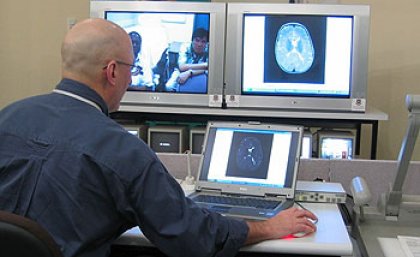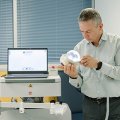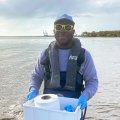
New telehealth services in the Western Downs region will reduce the cost burden on families who currently have to travel significant distances to see a specialist in a major city.
The University of Queensland’s Centre for Online Health is implementing a telehealth model in Dalby, Chinchilla and Miles, thanks to a partnership worth $1.3 million with natural gas developer QGC Pty Limited.
Telehealth is the delivery of health-related services and information from a distance using a range of communication techniques, such as videoconferencing and email.
Deputy Director, Associate Professor Anthony Smith from UQ’s Centre for Online Health, said a scoping study, conducted in 2012 and funded by QGC, highlighted the need for a health delivery service that reflected local community needs and incorporated telehealth.
“We will be implementing Health e-REGIONS, a model purposely designed for the area, tailored around the specific health needs and services currently available, including Queensland Health public services, general practice medical services and community health groups,” Dr Smith said.
“If a child in a regional area requires follow-up after a serious burn injury, parents often take time off work, organise other family members and travel the long distance to Brisbane before seeing a specialist and in some cases, appointments may only last a few minutes,” he said.
“Telehealth will improve access to specialist services which otherwise would not be readily available, saving patients the stress and cost of time away from home.
“In certain circumstances, telehealth is a viable alternative for patients living in the Western Downs.”
Dr Peter Bristow, Chief Executive from Darling Downs Hospital and Health Service said he looked forward to the development of a telehealth service in the region.
"Families coping with illness face enough challenges,” Dr Bristow said.
“Telehealth can avoid the additional expense and inconvenience of travelling for hours for a short consultation," he said.
"We are delighted these innovative services will be provided to our area."
QGC Vice President Sustainability Brett Smith said the project reflected QGC’s commitment to rural health services.
“Community health is a key focus of our A$150 million social contribution through which we manage social impacts and maximise benefits from our Queensland Curtis LNG project,” Mr Smith said.
“As part of this work, we funded a study of health services in the region in 2012 which highlighted the need for greater access to specialist medical care.
“We’re delighted to help fulfil this need by supporting the innovation of The University of Queensland.”
The two year contract to implement the Health e-REGIONS project was facilitated by UQ’s main research commercialisation company, UniQuest.
Media: Joanne Grey, University of Queensland Centre for Online Health, 07 3346 4754 or
j.grey2@uq.edu.au or Dr Anthony Smith, Deputy Director University of Queensland Centre for Online Health, 07 3346 4702 or asmith@uq.edu.au
Centre for Online Health
The Centre for Online Health (COH) is one of very few research and teaching centres in the world which focus on the evaluation of telehealth services for the delivery of healthcare. The COH is part of the School of Medicine, Faculty of Health Sciences. The COH undertakes research and teaching in the area of clinical telehealth (the delivery of health services at a distance using a range of communication techniques). The COH, which has internationally recognised expertise in the field of telehealth and telemedicine, is actively coordinating and managing telepaediatric services for Queensland from the Royal Children’s Hospital. A similar adult focused service was established at the Princess Alexandra Hospital by COH in July 2012. The COH is responsible for a broad range of collaborative projects which explore and evaluate innovative methods of providing clinical services in metropolitan and regional areas of Australia.
For further information, please refer to the Centre for Online Health website – www.uq.edu.au/coh.
UniQuest Pty Limited
Established by The University of Queensland in 1984, UniQuest is widely recognised as one of Australia’s largest and most successful university commercialisation groups, benchmarking in the top tier of technology transfer worldwide. From an intellectual property portfolio of 1500+ patents it has created over 70 companies, and since 2000 UniQuest and its start-ups have raised more than A$450 million to take university technologies to market. Annual sales of products using UQ technology and licensed by UniQuest are running at A$3 billion. UniQuest now commercialises innovations developed at The University of Queensland and its commercialisation partner institutions: University of Technology Sydney, James Cook University, University of Tasmania, Mater Medical Research Institute, and Queensland Health.
For further information, please refer to the UniQuest website – www.uniquest.com.au
QGC
QGC Pty Limited (ACN: 089 642 553) is a leading Australian coal seam gas explorer and producer focused on supplying gas to domestic and international markets. QGC is establishing one of Australia’s largest capital infrastructure projects to turn Queensland’s world-class coal seam gas reserves into liquefied natural gas. Queensland Curtis LNG, a priority project for QGC, involves expanding exploration and development in southern and central Queensland and transporting gas through a 540km underground pipeline network to Curtis Island near Gladstone where it will be liquefied. For further information visit: www.qgc.com.au











